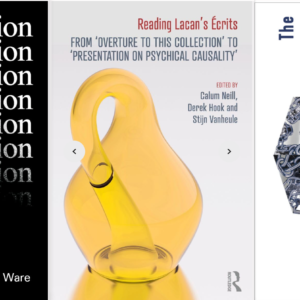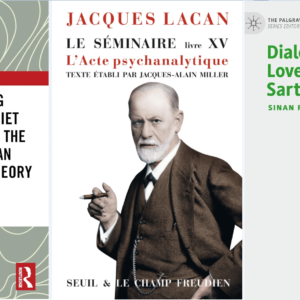News – January 2021
Want to receive this news via email each month? Sign up here.
20% off and free global shipping on all Routledge titles for LacanOnline.com readers. Use this link and code S031 at the checkout.
Beginning the year with excellent news, the Sigourney Trust last month announced the winners of The Sigourney Award 2020 for ground-breaking psychoanalysis and psychoanalytic thought across academic, humanitarian, and arts-focused fields. Two of this year’s four winners are Lacanian psychoanalysts. Firstly, Patricia Gherovici was awarded for work with marginalised communities and developing – in the judges’ words – “a new form of psychoanalytic practice oriented toward progressive social transformations for people segregated by “oppressive notions of normalcy.”” Secondly, Helí Rafael Morales Ascencio of The Lacanian Analytical Network and the School of the Psychoanalytic Letter was awarded for his work in the Social Foundation of Psychoanalysis, whose analysts provide care for victims of sexual violence and relatives of the 177,884 missing women in Mexico. According to the judges, “The pioneering work of Dr. Morales addressed the lack of institutional psychoanalytic work aimed at low-income people in Mexico and illustrates how intersecting psychotherapy and activism can help survivors of violence and their families.” The Sigourney Trust will shortly be accepting applications and nominations for The Sigourney Award 2021, submissions for which open on 1st March.
Additionally, a further congratulations to Patricia Gherovici & Christopher Christian who were announced last month as the joint winners of the 2020 Gradiva Award for their edited book Psychoanalysis in the Barrios: Race, Class, and the Unconscious. Demonstrating how psychoanalytic principles can be successfully applied to support disenfranchised Latino populations, their work represents a challenge to the notion that psychoanalysis is an expensive luxury available only to the rich. The book follows the 2016 documentary Psychoanalysis in el Barrio (trailer here) which can be viewed in full on PEP-Web (a 24-hour subscription to which is available for $11). The Gradiva Award is presented by the National Association for the Advancement of Psychoanalysis (NAAP) and “acknowledges the literary and artistic achievements of those who have created works that represent and promote psychoanalysis and psychotherapy.” The NAAP is currently open for submissions for the 2021 awards – for work published, produced or exhibited between 1st January 2020 and 30th April 2021. The deadline for submissions is 30th June 2021. More here.
Turning to the latest new book releases, Lacanian Perspectives of Blade Runner 2049, edited by Calum Neill, was published in December as part of the Palgrave Lacan Series. The collection includes contributions from Ben Tyrer, Todd McGowan, and Slavoj Zizek among others. Exploring the philosophical and psychoanalytic arguments that Denis Villeneuve’s 2017 movie provokes, the contributors discuss questions of being and the self, belief and knowledge, human and post-human across politics, ideology and spectatorship.
Lacan and Race: Racism, Identity and Lacanian Psychoanalytic Theory, edited by Sheldon George and Derek Hook, is newly-announced for publication by Routledge in July. Drawing on Lacanian theory in an attempt to understand race, racial identification and racism, this edited volume features contributions from authors on themes such as the ‘theft of enjoyment’, the Oedipus complex in colonial contexts, and the handling of issues around race in the contemporary clinic. Pre-order from Amazon or from the publishers using the discount code at the top of this page.
Robert Geal’s Ecological Film Theory and Psychoanalysis: Surviving the Environmental Apocalypse in Cinema has also been announced for publication by Routledge in July. Attempting a new Lacanian psychoanalytic eco-critique, Geal’s book combines psychoanalysis with ecolinguistics via a reading of film, to argue that “Cartesian subjectivity is an environmentally destructive ‘symptom’ that everyday linguistic activities like watching films reinforces.” Preorder with a discount via the link at the top of this page.
The Borderline Culture: Intensity, Jouissance, and Death by Željka Matijašević, announced for release in May, is likely to be of interest to Lacanians. Matijašević argues for the extension of the descriptive category ‘borderline’ to what she sees as the main facets of contemporary Western culture. Matijašević has previously published on the use of the concept ‘borderline’ in other cultures and from the perspective of Lacanian theory. See for instance her paper using the Lacanian term jouissance to understand the link between ‘borderline’ states and capitalism, and ‘Human vs. Mechanical in Lacan’s ‘Borderland’: Fetishistic Strategies’ in JCFAR from 2016.
Among events, the International Psychoanalytic University in Berlin will host a talk on Artificial Intelligence and Psychoanalysis with Dr Leon Brenner and Dr Isabel Millar on 13th February, via Zoom. The perspective offered by psychoanalytic theory on human sexuality and intersubjectivity will be discussed with reference to the technological ‘singularity’ that AI heralds, and what the notion of the sexbot tells us about the nature of fantasy. Millar’s The Psychoanalysis of Artificial Intelligence is due out from Palgrave on 12th April. Sign up via the link above to get the Zoom details.
Espace Analytique Ireland is offering a range of activities this year including reading groups, seminars, and group supervision. Currently there’s an online reading group on Studies in Hysteria, and upcoming lectures include on ‘Psychoanalysis, Psychiatry and Anti-Psychiatry’ on 13th February with Alain and Catherine Vanier, and intergenerational trauma by Andre Michels, for which the date is to be announced. Monthly online group supervision with Alain and Catherine Vanier is also offered.
The NWRPA has announced its winter/spring timetable for talks, all of which will be held on Zoom. Among them Philip Hill on ‘Feelings, Truth and Clinical Technique,’ three talks by Mark Fisher on the tragic dimensions of transference, and an online art exhibition of work by Paul Melia, ‘The Interpretation of Dreams Painted.’
Dr Ehsan Azari of the NIDA Lacan Study and Reading Group has made available the texts of his lectures on the reading of Lacan’s Seminar V on Formations of the Unconscious. The latest seminar from December demystifies the concepts of demand and desire in Lacan. The series has been running since May last year and each month the texts are published on the NIDA page here, with 14 seminars available so far. The next session will be on 26th February – attendance is free with no booking required. Details via the link above.
On Saturday 13th February at The Cyprus Society of the School of the Freudian Letter, Marinos Maliali will be interviewing Petros Patounas, Lacanian Psychoanalyst of the School, on ‘The Clinic of the Act.’ Topics to be addressed will include the desire of the analyst, the sinthome and the end of analysis, and the testimony of the Pass. The seminar will be delivered via Zoom and full details of how to sign up are via the link above. Later in the month, Llewellyn Brown will present for The School of the Freudian Letter UK in a webinar entitled ‘BREATH – a token of life’. Brown is the author of Beckett, Lacan and the Voice (2016) and Beckett, Lacan and the Gaze (2019).
The Dublin Lacan Study Group has announced a series of five lectures on Lacan’s Seminar IX on Identification. Beginning on 28th February and running up to the end of June, lectures will be given by analysts from around the world, following the Gallagher translation of Lacan’s Seminar available here. As a reminder, Lacan Salon is also undertaking a study of Seminar IX, with biweekly Seminars running up to the end of June.
Finally, registration is now open for the 2021 NLS Congress, ‘Bodily Effects of Language’, taking place 22nd-23rd May. A special Early Bird rate is in place until 11th April at €160 for individuals and €80 for those 25 or under. Originally planned to take place in Ghent, the conference will now be take place on Zoom. Simultaneous translations between French and English will be provided. The Argument for the Congress, by Alexandre Stevens, is available here.
Got news? Get in touch.




Leave a Reply